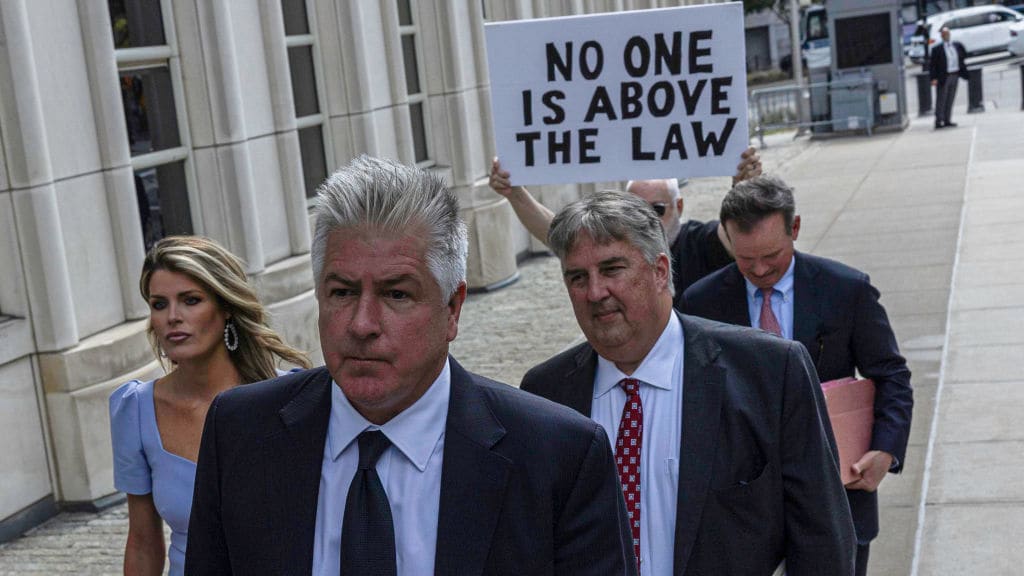Prosecutors reportedly seek to compel Trump lawyer's testimony by citing crimes in classified papers case


A free daily email with the biggest news stories of the day – and the best features from TheWeek.com
You are now subscribed
Your newsletter sign-up was successful
Federal prosecutors investigating former President Donald Trump's mishandling of classified documents are seeking to compel one of his lawyers to testify about his work with Trump by suggesting those legal services were used in a crime, The New York Times and other news organizations reported Tuesday night.
The lawyer, Evan Corcoran, previously invoked attorney-client privilege repeatedly when asked certain questions before a federal grand jury, The Associated Press reports. Prosecutors working with Special Counsel Jack Smith have asked a federal judge to revoke that privilege in this case through the crime-fraud exception, suggesting they believe they have evidence Trump and maybe his allies committed a crime. The federal judge, Beryl Howell, will consider the motion in a closed-door hearing in Washington, D.C.
The Justice Department has already said Trump may have violated the law by keeping classified defense documents after leaving office and obstructing the effort by federal agents to get them back. It isn't clear if prosecutors, in invoking the crime-fraud exception, suspect criminal misconduct by Corcoran and Trump, Trump and other associates, or Trump alone, the Times reports.
The Week
Escape your echo chamber. Get the facts behind the news, plus analysis from multiple perspectives.

Sign up for The Week's Free Newsletters
From our morning news briefing to a weekly Good News Newsletter, get the best of The Week delivered directly to your inbox.
From our morning news briefing to a weekly Good News Newsletter, get the best of The Week delivered directly to your inbox.
Along with compelling Corcoran's testimony about Trump's handling of top secret government papers, prosecutors also want him to answer questions about one of Trump's top aides, ABC News reports. Smith's team has been asking a lot of questions about Trump associate Boris Epshteyn, who is deeply involved in Trump's legal defense in the several investigations, per the Times.
"It remains unclear whether Trump or anyone else will be charged, though the move is a notably aggressive act by Smith's team," AP reports. "Smith is separately investigating efforts by Trump and his allies to overturn the results of the 2020 election and recently subpoenaed former Vice President Mike Pence as part of that probe." Pence is trying to avoid that testimony through a separation-of-powers argument because he was acting as president of the Senate, not U.S. vice president, on Jan. 6.
A free daily email with the biggest news stories of the day – and the best features from TheWeek.com
Peter has worked as a news and culture writer and editor at The Week since the site's launch in 2008. He covers politics, world affairs, religion and cultural currents. His journalism career began as a copy editor at a financial newswire and has included editorial positions at The New York Times Magazine, Facts on File, and Oregon State University.
-
 How the FCC’s ‘equal time’ rule works
How the FCC’s ‘equal time’ rule worksIn the Spotlight The law is at the heart of the Colbert-CBS conflict
-
 What is the endgame in the DHS shutdown?
What is the endgame in the DHS shutdown?Today’s Big Question Democrats want to rein in ICE’s immigration crackdown
-
 ‘Poor time management isn’t just an inconvenience’
‘Poor time management isn’t just an inconvenience’Instant Opinion Opinion, comment and editorials of the day
-
 Witkoff and Kushner tackle Ukraine, Iran in Geneva
Witkoff and Kushner tackle Ukraine, Iran in GenevaSpeed Read Steve Witkoff and Jared Kushner held negotiations aimed at securing a nuclear deal with Iran and an end to Russia’s war in Ukraine
-
 Pentagon spokesperson forced out as DHS’s resigns
Pentagon spokesperson forced out as DHS’s resignsSpeed Read Senior military adviser Col. David Butler was fired by Pete Hegseth and Homeland Security spokesperson Tricia McLaughlin is resigning
-
 Judge orders Washington slavery exhibit restored
Judge orders Washington slavery exhibit restoredSpeed Read The Trump administration took down displays about slavery at the President’s House Site in Philadelphia
-
 Kurt Olsen: Trump’s ‘Stop the Steal’ lawyer playing a major White House role
Kurt Olsen: Trump’s ‘Stop the Steal’ lawyer playing a major White House roleIn the Spotlight Olsen reportedly has access to significant US intelligence
-
 Hyatt chair joins growing list of Epstein files losers
Hyatt chair joins growing list of Epstein files losersSpeed Read Thomas Pritzker stepped down as executive chair of the Hyatt Hotels Corporation over his ties with Jeffrey Epstein and Ghislaine Maxwell
-
 Judge blocks Hegseth from punishing Kelly over video
Judge blocks Hegseth from punishing Kelly over videoSpeed Read Defense Secretary Pete Hegseth pushed for the senator to be demoted over a video in which he reminds military officials they should refuse illegal orders
-
 Trump’s EPA kills legal basis for federal climate policy
Trump’s EPA kills legal basis for federal climate policySpeed Read The government’s authority to regulate several planet-warming pollutants has been repealed
-
 House votes to end Trump’s Canada tariffs
House votes to end Trump’s Canada tariffsSpeed Read Six Republicans joined with Democrats to repeal the president’s tariffs
